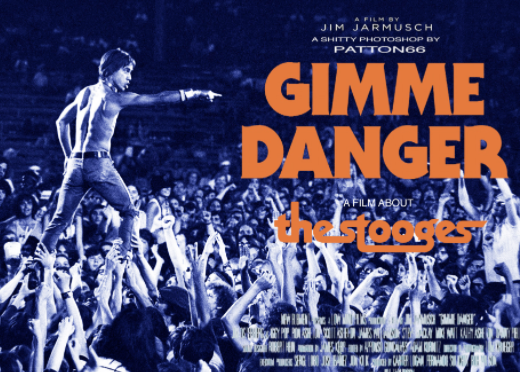The 60s in Ann Arbor, Michigan set the ideal tone of rebellion for Jim Osterberg a.k.a. Iggy Pop to wash away the California-infused hippie dippy vibes that pervaded the decade. As Iggy will tell you, there was more “American Idol” bullshit going on during this era than people like to admit, with record labels shoving a certain genre down the throats of the masses whether they wanted or were aware of it.
This revelation didn’t hit him until after forming his first band in 1965, The Iguanas, when he was still a drummer, pulling Tommy Lee-esque shenanigans before Lee was a thought in the universe. Elevated high on a platform that, of course, collapsed at one point, Pop was always willing to push physical boundaries for music, a point that Jim Jarmusch iterates throughout Gimme Danger (named after The Stooges song of the same name, and presumably as a tongue in cheek homage to The Rolling Stones documentary, Gimme Shelter, released in 1970). Showing a tender side to the rocker frequently viewed as a prickly pear, Jarmusch lets Pop do most of the talking, with his bandmates, Ron Asheton, Scott Asheton, James Williamson, Steve Mackay, and Mike Watt, given their moment to shine as well.
The genesis of Pop is told with reverence by Jarmusch, no stranger to the rockumentary after 1997’s Year of the Horse, who intermixes elements of animation and pop culture-related flashbacks to create an atypical documentary style (and one would expect nothing less than atypical when the subject is The Stooges). Named in honor of The Three Stooges (because everyone hated on them but couldn’t explain why), Pop’s band was initially called The Psychedelic Stooges, but after getting signed to Elektra, he called Moe Howard to ask permission to use the shortened name, The Stooges. Howard bellowed, “I don’t care what you call yourselves, as long as you’re not the Three Stooges!” And so the band was fully birthed.
Perhaps more than the baby boomer generation, Iggy’s was the gimme generation. The Rolling Stones had their “Gimme Shelter” song and documentary of the same name (a nod not lost on Jarmusch, clearly) and ABBA had their “Gimme! Gimme! Gimme! (A Man After Midnight)”. Life was, even then, about instant gratification, but of a more visceral nature. Pop was an exemplification of this, dabbling in a range of musical styles (the quote “I smoked a joint and realized I was not black” after he went to Chicago to attempt playing blues comes to mind) before transcending fully into the stage presence that he would become known for.
Let us not forget Pop is the one who invented the stage dive, suffering a busted tooth for the innovation after two “big girls” stepped aside to let him take his tumble. Still, The Stooges were far from receiving their due, ultimately getting dropped by Elektra after 1971’s Fun House. This allowed even more opportunity for the band to pursue their heroin addiction, which was briefly staved off during Pop’s David Bowie period, bringing him and The Stooges to the UK where their recordings eventually led to Raw Power.
During the New York City/Chelsea Hotel period of The Stooges (pre-L.A., because everyone starts in New York and ends up in L.A.–except maybe Marilyn Monroe and James Dean), the band had their run-in with Nico, who soon became attached to Pop after a breakup with Lou Reid, prompting her, according to Pop, to make remarks in the studio like, “You’re so much more talented than Lou.” Her Yoko Ono pall over the band is one of the most intriguing aspects to learn about from Gimme Danger, highlighting the point that there is never room for love or romance in music. Just sex. Or a brief dalliance at best.
But through all the ups and downs of The Stooges (Scott Asheton at one point had to resort to taxi driving), it seemed the band was destined to come together after every hiatus. And Iggy, the man who grew up in a trailer (the same one from 1954’s The Long, Long Trailer starring Lucille Ball and Desi Arnaz, a clip of which Jarmusch masterfully interweaves into the documentary as Iggy name checks the film), is still salt of the earth. Still that Michigan boy who represents what rock ‘n’ roll once stood for, in many ways an offshoot of that dead concept, the American dream. Like that other icon he opened for in Dublin in 2004, Madonna–also from Michigan, also a University of Michigan dropout and also inducted into the Rock and Roll Hall of Fame the same year in 2010–Pop is a vestige of being truly hungry for something because of his middle classness. Being that the middle class is practically nonexistent as of now, it’s no wonder the U.S. isn’t churning out icons with gumption anymore.
As Pop eloquently put it at the New York Film Festival, “Sometimes I think I’m Jerry Lewis. I just try to use my body to, you know, kind of like a funnel. To focus the music that’s going on and then shoot it out somewhere else.” All these decades later, his energy is still pouring out, now onto the silver screen from the white-haired auteur who is equally as iconoclastic.





















